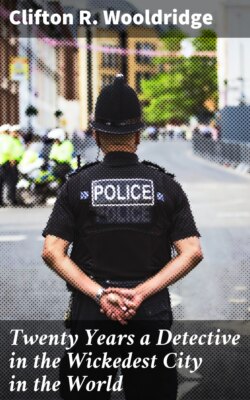Читать книгу Twenty Years a Detective in the Wickedest City in the World - Clifton R. Wooldridge - Страница 7
На сайте Литреса книга снята с продажи.
CLIFTON R. WOOLDRIDGE
AMERICA'S FOREMOST DETECTIVE.
ОглавлениеTable of Contents
Clifton R. Wooldridge was born February 25, 1854, in Franklin county, Kentucky. He received a common school education, and then started out in the world to shift for himself. From 1868 to 1871, he held the position of shipping clerk and collector for the Washington Foundry in St. Louis, Missouri. Severing his connection with that company, he went to Washington, D. C., and was attached to the United States Signal Bureau from March 1, 1871, to December 5, 1872. He then took up the business of railroading, and for the following nine years occupied positions as fireman, brakeman, switchman, conductor and general yard master.
When the gold fever broke out in the Black Hills in 1879, Mr. Wooldridge along with many others went to that region to better his fortune. Six months later he joined the engineering corps of the Denver & Rio Grande railroad and assisted in locating the line from Canon City to Leadville, as well as several of the branches. The work was not only very difficult, but very dangerous, and at times, when he was assisting in locating the line through the Royal Gorge in the Grand Canon of the Arkansas, he was suspended from a rope, which ran from the peak of one cliff to the other, with his surveying instruments strapped to his back. This gorge is fifty feet wide at the bottom and seventy feet wide at the top, the walls of solid rock rising three thousand feet above the level of the river below. The work was slow and required a great deal of skill, but it was accomplished successfully.
Mr. Wooldridge went to Denver in 1880 and engaged in contracting and mining the following eighteen months. He then took a position as engineer and foreman of the Denver Daily Republican, where he remained until May 29, 1883. The following August he came to Chicago and took a position with the Chicago, Milwaukee & St. Paul railway. In 1886, he severed his connection with the railroad and founded the "Switchman's Journal." He conducted and edited the paper until May 26th, when he was burned out, together with the firm of Donohue & Henneberry at the corner of Congress street and Wabash avenue, as well as many other business houses in that locality, entailing a total loss of nearly $1,000,000. Thus the savings of many years were swept away, leaving him penniless and in debt. He again turned his attention to railroading and secured a position with the Chicago, Burlington & Quincy railroad and had accumulated enough money to pay the indebtedness which resulted from the fire, when the great strike was inaugurated on that road in February, 1888. The strike included the engineers, firemen and switchmen, and continued nearly a year. On October 5th of that year Mr. Wooldridge made application for a position on the Chicago police force, and having the highest endorsements, he was appointed and assigned to the Desplaines Street Station. It was soon discovered that Wooldridge as a police officer had no superiors and few equals. Neither politics, religion, creed, color, or nationality obstructed him in the performance of his police duties, and the fact was demonstrated and conceded times without number that he could not be bought, bribed, or intimidated. He selected for his motto, "Right wrongs no man; equal justice to all." His superior officers soon recognized the fact that no braver, more honest or efficient police officer ever wore a star or carried a club.
The mass of records on file in the police headquarters and in the office of the clerk of the municipal and criminal court demonstrate conclusively that he has made one of the most remarkable records of any police officer in the United States if not in the world. Mr. Wooldridge has seen twenty years of experience and training in active police work. Ten years of this time he was located in what is commonly known as the Levee district, a territory where criminals congregate and where crimes of all degrees are committed.
